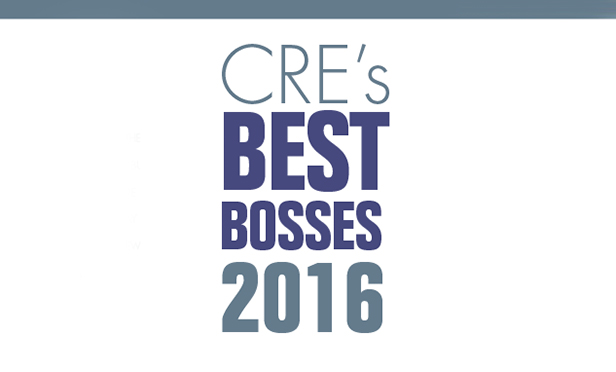 This is an HTML version of an article that ran in Real Estate Forum. To see the story in its original format, click here. If one were to look on paper at what makes a great leader in commercial real estate, the criteria would certainly include financial performance, transaction volume, shareholder returns or the number of properties the firm owns or manages—depending on the type of business the individual leads. And a quick look at some of the data available on the industry would make the task of selecting CRE’s top leaders relatively easy. Yet true leaders manifest themselves not only through performance but also—and arguably more importantly—by the way their employees feel about them. After all, real estate is a relationship business, and relationships are all about people. Even the most qualified and experienced C-suite executive would be adrift in such a tumultuous business without a talented, motivated and dedicated crew. With this in mind, we at Real Estate Forum decided to find out who were considered among the industry’s best leaders as part of our inaugural Leadership Issue. Of course, we sought out such factors as ambition, accomplishment and financial prowess. But we also looked beyond those qualities to turn up individuals who were likable, inspirational, innovative and who lead by example. In short, we were looking for leaders who rise above the C-suite sea to have talented professionals clamoring to work for—and with—them. The response to our call for the “Best Bosses in the Business” far exceeded our expectations, with more than 100 nominees submitted for consideration. The editors narrowed down the selections to 26 finalists based on the individuals’ most remarkable characteristic; in fact, the breadth and quality of the nominees was so great that we decided to increase the number of finalists—and their superlatives, if you will—from the initially planned 15. We then conducted a thorough poll of our readership to determine who would grace the issue’s cover as the Best Boss in the Business. Nearly 4,000 votes later, we had our winner in Andrew Wright, the young superstar who founded Franklin Street a decade ago. Yet all 26 of the individuals on the following pages have justly earned the reputation of “Best Boss,” if one were to look at how their employees feel about them. Read on to see who else made the final cut, and what their colleagues have to say about them. And for more information about our process in selecting the finalists, read our detailed methodology section at the end of this feature.
This is an HTML version of an article that ran in Real Estate Forum. To see the story in its original format, click here. If one were to look on paper at what makes a great leader in commercial real estate, the criteria would certainly include financial performance, transaction volume, shareholder returns or the number of properties the firm owns or manages—depending on the type of business the individual leads. And a quick look at some of the data available on the industry would make the task of selecting CRE’s top leaders relatively easy. Yet true leaders manifest themselves not only through performance but also—and arguably more importantly—by the way their employees feel about them. After all, real estate is a relationship business, and relationships are all about people. Even the most qualified and experienced C-suite executive would be adrift in such a tumultuous business without a talented, motivated and dedicated crew. With this in mind, we at Real Estate Forum decided to find out who were considered among the industry’s best leaders as part of our inaugural Leadership Issue. Of course, we sought out such factors as ambition, accomplishment and financial prowess. But we also looked beyond those qualities to turn up individuals who were likable, inspirational, innovative and who lead by example. In short, we were looking for leaders who rise above the C-suite sea to have talented professionals clamoring to work for—and with—them. The response to our call for the “Best Bosses in the Business” far exceeded our expectations, with more than 100 nominees submitted for consideration. The editors narrowed down the selections to 26 finalists based on the individuals’ most remarkable characteristic; in fact, the breadth and quality of the nominees was so great that we decided to increase the number of finalists—and their superlatives, if you will—from the initially planned 15. We then conducted a thorough poll of our readership to determine who would grace the issue’s cover as the Best Boss in the Business. Nearly 4,000 votes later, we had our winner in Andrew Wright, the young superstar who founded Franklin Street a decade ago. Yet all 26 of the individuals on the following pages have justly earned the reputation of “Best Boss,” if one were to look at how their employees feel about them. Read on to see who else made the final cut, and what their colleagues have to say about them. And for more information about our process in selecting the finalists, read our detailed methodology section at the end of this feature.
 THE BEST BOSS OF 2016 Andrew Wright
THE BEST BOSS OF 2016 Andrew Wright
Launching and growing a new company at a time when most real estate firms were downsizing and cutting costs, if not going out of business, would seem to be a fool’s errand. Yet for Andrew Wright, the gamble paid off—and well—thanks to a fierce determination and a strong entrepreneurial spirit. CEO and managing partner, Wright was 26 when he established Franklin Street in 2006. Since then, he has grown the full-service CRE firm from four people operating out of an apartment in Tampa, FL to 200 staffers in six offices in major markets throughout the Southeast, all focused on delivering value-added solutions to CRE owners and occupiers nationwide. Despite his young age, Wright has a deep knowledge of the market, having negotiated the resolution of more than $800 million in distressed CRE debt since 2009. With this expertise, in 2012 Wright implemented Franklin Street’s new management strategy, providing a balanced picture of the company’s goals so that all employees understand them. Namely, the focus was on the training and recruitment of top talent and a focus on revenue growth by offices and verticals. He reviews the strategy map with the entire company every quarter and highlights ways in which the firm is successfully executing its goals—all while providing his employees with the tools and leadership they need to succeed. He also makes sure Franklin Street advocates mentorship from company leaders to new professionals who are learning the market.
To reach his 10-year goal of growing Franklin Street to be a national brand with offices in the top 35 metro markets, Wright is looking to grow organically. To accomplish this, he makes it his mission to make the firm a “great place to work.” As such, he’s implemented such initiatives as regularly scheduled “lunch and learns,” sales meetings to share business development opportunities and “all-hands” collaboration meetings to share trends and updates. He offers mentorship-based employee training with internal promotion opportunities, quarterly team-building events in each office and annual reward trips for top sales and corporate employees. He also established Employee Appreciation Day as a paid holiday and holds and an annual year-end party and awards ceremony for all offices. That’s in addition to the firm’s philanthropic activities; staffers receive company-paid time off to volunteer in the community and, in 2014, the United Way Suncoast recognized Franklin Street as a Top Volunteer Workplace.
“The quality of your relationships is what will stand the test of market cycles. It takes a lifetime to build a reputation. It can take 30 seconds to ruin it.”
Yet what’s written on paper only tells so much of a story. Of the dozens of comments Wright’s colleagues shared, here are a few that illustrate his influence as a leader. Samantha Berk Plate, a real estate services director, tells of Wright’s honesty and openness as a leader. “We were at a large but casual company picnic with all of the employees, from top producers to property management workers,” she relates. “The rest of us were eating and I asked if he was going to eat lunch yet. He said he would after he gives his speech to the group—he always has the most motivational and sincere speeches. When I asked why, he said he gets nervous to speak in front of his employees because of how much it means to him. This was coming from a man who speaks in front of countless panels and daunting situations. It just goes to show how much he truly cares. To him, business is personal, in the most positive way.” HR director Becky Berns tells of one of Franklin Street’s quarterly corporate volunteer events in which over 50 Tampa team members participated in the United Way Day of Caring, cleaning group cabins at the Children’s Home. “Everyone was assigned tasks first thing in the morning,” she recounts. “Andrew, however, had an early morning appointment so he arrived at the Children’s Home about a half hour after all the assignments had been handed out. When he arrived, he walked up to me and said, ‘I’m ready to go! What’s my assignment?’ “Just what assignment do you give your CEO? Being relatively new with the company I replied cautiously, ‘Well…we don’t have anyone to mop yet,’ and waited for a reaction. Andrew just smiled at me and said, ‘Awesome! I’m going to be the Mopping Captain!’ He grabbed two people who’d just walked in and said his team would start in the back and work their way forward. “True to his word, he led his team with vigor as they diligently scrubbed the floors of every single room in every single cabin. I keep a picture of Andrew and his mop and bucket from that morning in my office to this day. Andrew leads by example and no one has more passion or enthusiasm. He has a special spark and an energy like no other. When he is not with us, we miss him…and when he is with is, we shine in the reflection of his spirit.” Others put their thoughts more simply: “Andrew’s values influenced my decision to pursue a job here;” “I would follow his lead anywhere;” “He is like no other CEO I’ve ever worked with in my 30 years in CRE;” and, “To call Andrew a boss is just not enough. He is a mentor and a friend.”
 THE INFLUENCER Gail S. Ayers
THE INFLUENCER Gail S. Ayers
When you’re the head of a 10,000-member organization dedicated to advancing the role of women in what had long been a male-dominated industry, you need the clear vision, dedication and communication skills to make your voice heard in the business. When that organization is comprised solely of volunteers, it takes a special kind of individual to get everyone on board with the mission and inspire those involved to work together to achieve collective goals. With her professionalism and commitment, Gail Ayers is, as several of our survey respondents put it, “a true representation” of CREW Network and its mission and is the “ideal advocate” and “role model” for women in this business. Since taking over as the group’s second-ever CEO 11 years ago—and adding the title of president of the CREW Network Foundation—Ayers has been the voice and face of the 73-chapter organization, and for women in CRE. She’s brought her 25-plus years of business experience—and skills in collaboration, knowledge of technology and financial acumen—to help bring the CREW Network to “the next level,” according to Marianne Ajemian of Nutter, McClennen & Fish. “She won the confidence of the employees and members and changed the culture from one of looking inward to one that’s always thinking about how to make a positive impact on the industry in order to maximize opportunities for women in real estate.”
“Always do the things that scare you. It helps you focus on where you need to grow—and go.”
Even those overseeing Ayers’ performance extol her virtues. Judith Nitsch of Nitch Engineering Inc. served on the CREW board for five years and was the national president in 2014. As such, she performed Ayers’ performance review. “The feedback on her from our other nine board members was phenomenal,” she relates. “Several commented that they couldn’t think of anything that needed improvement.”
 MOST INSPIRATIONAL Michael W. Brennan
MOST INSPIRATIONAL Michael W. Brennan
Michael Brennan has orchestrated more than $10 billion in industrial real estate transactions, forming some of the most successful firms in the business, including First Industrial, in the course of his 25-year career. His current firm is celebrating its fifth anniversary this year with $1 billion in real estate investments. He literally wrote the book on the industrial property sector and has received accolades for his leadership achievements from both the CRE community and the broader business world. And, in addition to serving on board of the Chicago Public Library Foundation, he is executive director of the University of Wisconsin’s James A. Graaskamp Center for Real Estate. Yet all of these achievements do not define who Brennan is as a leader, if the input we received from his staff and colleagues is any indication. When discussing Brennan—who today is chairman and managing principal of Brennan Investment Group—they use words like “caring,” “kind,” “tireless,” “committed,” “nurturing” and, above all, “inspirational.” His success story, combined with a genuine appreciation for, and openness with, the people who work with him is what makes him an ideal leader and one that CRE professionals want to follow.
“When anyone reflects back on the best boss they ever had, it was never their brilliance that endeared them to us. It was how they made us feel about ourselves.”
Here is just a handful of the hundreds of comments we received about Brennan in our survey: “I feel energized and excited to come to work each day.” “It’s great to come to work every day and know who is steering the ship.” “He is one of us: he knows the businesses, knows the demands of our job and is willing to do any job in our company.” “His openness and authenticity are the two attributes I noted immediately the first day I met him.” “He makes everyone in the organization feel like their tasks are crucial to the overall progression of the company.” “He is the the glue that holds our company together.”
And, from a professional who actually left the firm to branch out, “Upon my departure, he was very supportive and complimentary during the interview process. Michael Brennan is the best boss I have ever worked with throughout my career.”
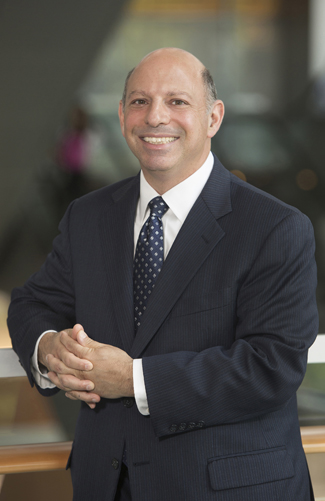 MOST INNOVATIVE David Brickman
MOST INNOVATIVE David Brickman
While he isn’t the CEO of the mortgage giant, David Brickman has led what has possibly been Freddie Mac’s most successful division for the past five years. Since he’s assumed control of Freddie’s Multifamily Group as EVP, he has helped to more than triple its business volume to $47.3 billion and grow its securitization volume more than five times to $37.7 billion. That’s helped the firm to create a number of new lending products to finance a broader range of multifamily asset classes and develop a series of capital market executions that open new options to transfer credit risk from the multifamily market to private investors. The net result is a win-win across the board: greater capital access for rental housing in the country. It’s Brickman’s vision and innovative spirit that’s led to those results, moving Freddie Mac MF from a chiefly portfolio business to a securitization business. This required retooling all aspects of the organization—from products and legal infrastructure to loan processing and servicing—while continuing to build out the securitization function.
“The world is changing, along with housing in America and the urban landscapes in many cities. We strive to be at the forefront of that change and help to steer it in a positive direction.”
Dubbed the “Freddie Mac difference,” the new model is considered the future of housing finance and includes such innovations as the K-Deal program, a new type of multifamily MBS, Small Business Certificates, a Tax-Exempt Loan structure, Structured Credit Risk Notes and two new areas of business, Manufactured Housing and Small Balance loans. All of these helped to grow Freddie Mac Multifamily into a nearly $50-billion business, the largest in its class, and expanded the range of property types that can access capital. In fact, Freddie Mac was the largest single source of multifamily finance in the US last year, with $47.3 billion in loan purchase and bond guarantee volume as well as a GSE market share of 53%. Those who work with him say Brickman’s leadership qualities are a huge factor in keeping employees motivated and excited to come to work. As Freddie Mac SVP John Cannon puts it, “David is a true innovator. He sees possibilities when others simply see roadblocks.”
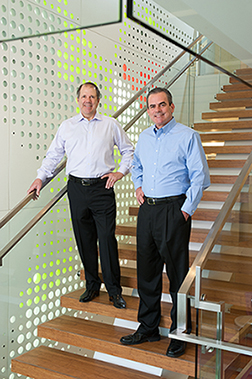 MEN OF THE PEOPLE Richard J. Campo & D. Keith Oden
MEN OF THE PEOPLE Richard J. Campo & D. Keith Oden
For an owner/operator of multifamily real estate, the satisfaction of the tenants that live in their communities is of utmost importance. In the eyes of CEO Ric Campo and president Keith Oden, co-founders of Camden Property Trust, the success of their firm relies as much on its people is it does on the communities it owns and operates. The company describes itself as a family with a culture that revolves around empowering people to do their best, and have fun doing it. In fact, having fun is one of the company’s nine core values. And they do. One staffer said, “Working with these bosses is like working with old friends from the past.” Another 17-year employee relates, “I can’t say that there has ever been a day I didn’t look forward to going to work.” The founders are, as many insisted, a large factor in many employees’ decision to stay with the firm for so long.
“Being successful in business is not about making money or having a good position. It’s about doing good for the broader community.” —Campo
Other proof points? Camden’s been named one of the ’100 Best Companies to Work For’ in America by Fortune for nine consecutive years, ranking in the top 10 for five of those years. It also got the top spot for diversity in the workplace and garnered high ratings among the best workplaces for women and millennials. Campo and Oden regularly join Camden employees at team-building, training and employee recognition events and are even active on social media in promoting both the firm’s and employees’ achievements. Add to that their philosophy of “sharing the wealth,” bestowing surprise bonuses on employees, setting up scholarship funds and emergency relief funds for its team. Outside the firm, the company-promoted “Camden Cares” initiative allows employees to have a say in how they give back to their communities on a volunteer basis.
 MOST SOCIALLY CONSCIOUS Daryl J. Carter
MOST SOCIALLY CONSCIOUS Daryl J. Carter
For Daryl Carter, investing in affordable assets is more than just a business. It’s a vehicle through which he transforms entire communities by delivering deeply needed, high quality affordable housing to underprivileged and ethnically diverse neighborhoods. That’s not just lip service. When Avanath Capital Management invests in a property, the founder, chair and CEO makes it a point to also invest in the surrounding community, providing resident support services, building engagement and ensuring sustainability. At each property, Carter and his team work to forge strong connections with local cities and partner with local non-profits and civic leaders to introduce a variety of no-cost services, including financial literacy courses, computer training, sports and mentoring programs, to help residents become socially engaged and economically self-sufficient. Rev. Dr. O. Leon Wood, Jr., president of Success in Challenges Inc., works with Carter on very sensitive issues affecting the lives of many people. “In all cases,” Wood relates, “he has shown a deep sensitivity for the concerns and welfare of all people.”
“In order to become more successful, it’s important to study success”
Carter’s commitment is just as strong internally—he has dedicated himself to recruiting and partnering with leaders from all backgrounds and has made a concerted effort to recruit a diverse array of property level and executive staff at his firm. The former NMHC chairman is also a leader on the NMHC Diversity Committee and serves as a voice for diversity in the multifamily sector. According to one staffer, Carter “will make it his duty to change the world for the better.” On a more personal level, another employee tells of Carter’s giving nature: “Recently, I mentioned to Daryl that I was having to raise funds to get a therapy dog for my special-needs son. The following day, he notified me that our company was going to fund the dog for my son. I cannot comment enough on his generosity and level of care for his employees. He is absolutely exceptional.”
 MR. SUSTAINABILITY Michael Dardick
MR. SUSTAINABILITY Michael Dardick
“Inspiration is everywhere. It’s in the people we meet, selfless acts of kindness, the environment around us and within ourselves. Live with your eyes wide open and seek to inspire others.” Those are the words of Michael Dardick, who as CEO of Granite Properties tells his team that the word “inspire” is all about taking responsibility, leading and helping others be better whether at home, at work or in the community. Along with that is the firm’s commitment to the environment. Being stewards of the planet is an integral company focus, and Granite is constantly striving to lessen its carbon footprint. Many of its properties are Energy Star certified, Green Globe recipients and LEED certified, resulting in lower utility costs for our customers and more valuable, better-performing properties. The firm also offers the Granite Leadership University class, Going Green 101, to educate employees around green initiatives for at work and home. Both employees and customers have convenient ways to recycle and all of Granite’s properties offer E-waste Recycling drives. The Dallas corporate office also hosts an annual tradition called “Stash the Trash,” where employees take the entire day to clean out and purge the office in an environmentally smart way.
“We can all do something today to help improve tomorrow.”
Serving the community is as important to Dardick as serving the environment. Leading by example, he’s involved with numerous local charities, and encourages Granite employees to follow suit; each employee has 40 paid hours yearly to perform charity work and, in 2015 alone, the Granite team racked up 5,580 hours of volunteer work. Additionally, the firms’ Community Involvement Committees actually have a major voice in where and how the Granite directs its charitable giving. Often described as the “heart and soul” of Granite, Dardick goes out of his way to make a difference on this planet, both physically and emotionally.
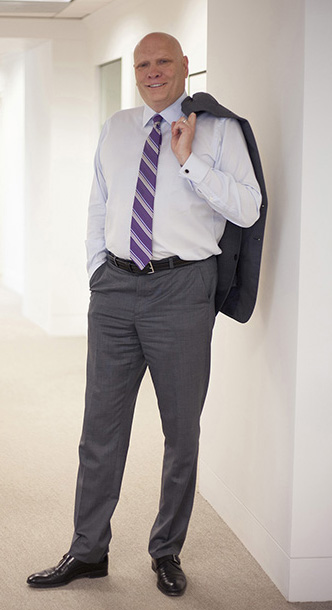 VOICE OF THE INDUSTRY Jeffrey DeBoer
VOICE OF THE INDUSTRY Jeffrey DeBoer
When it comes to representing the interests of the commercial real estate industry on Capitol Hill, there is arguably no stauncher advocate than Jeff DeBoer. Involved in politics and CRE for 30 years and president and CEO of the Real Estate Roundtable for almost two decades, he speaks for the leadership of the nation’s top real estate firms and trade associations. Collectively, The Roundtable members’ portfolios contain over five billion square feet of commercial properties valued at more than $1 trillion and more than 3.5 million apartment and hotel units. DeBoer has been at the forefront of every major piece of legislation affecting the real estate industry during the past three decades. Among the many topics currently on DeBoer’s agenda are tax rules applied to real estate, energy-related issues and CRE lending policy. Still, he does take into account the intricacies of the various fields within CRE. According to DeBoer, If the policy is good for the asset, our attitude is it’s going to be good for all of the people that are associated with owning, operating and financing the asset.”
“Don’t be afraid to take risks and understand why you succeeded or failed. Do not make excuses.”
As those who work with him attest, DeBoer’s key tenet is honesty. “The truth can hurt,” he says, “but if you are not leading from an honest position, then decisions that flow from that position are distorted, and are made and implemented for the wrong reasons. I like to benefit from all kinds of perspectives. I will always listen. But I make sure it is my own path I’m following and not someone else’s, and then pursue that path in a way that demonstrates that I’m not afraid to fail.” According to DeBoer, the Roundtable is where real estate and public policy meet, and he intends to be the voice for CRE as part of that policy debate.
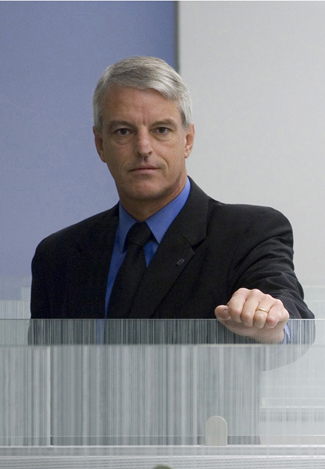 THE GLOBAL CITIZEN Colin Dyer
THE GLOBAL CITIZEN Colin Dyer
“No matter where the cutting edge is, he makes sure we are there.” That’s what one respondent said about JLL president and CEO Colin Dyer, who has made diversity and sustainability foundational elements of the company’s operations. In other words, corporate citizenship is tantamount to success, and as a successful global company, Dyer has taken massive steps to ensure the firm he’s led since 2004 remains focused on sustainability. That means working to promote and protect the economic, social and environmental interests of current and future stakeholders, having a positive impact on the world around it and contributing to the world’s prosperity over the long term. Dyer ensures that all his employees understand that sustainability is a driver for improved performance, better client service, better value to shareholders and better career opportunities for employees. Dyer is executive sponsor of both JLL’s Energy and Sustainability Services business line and the company’s Corporate Sustainability activities, making sure sustainability is integrated across both JLL’s services to clients and its own operations, as well as those of the firm’s clients. It’s estimated that these efforts have helped its US clients save more than $47 million and 278,000 metric tons of CO 2 in 2014 alone, resulting in year-over-year energy energy savings of 27%. Dyer is also active in such organizations as the Ethisphere Institute, the World Economic Forum’s Partnering Against Corruption Initiative, the United Nations Global Compact and the Boston College Center for Corporate Citizenship. More than one-third of JLL’s board consists of women, including its head. The firm has received countless environmental, corporate citizenship and diversity awards for its initiatives, including Fortune’s 100 Most Admired Companies in 2015, a perfect score on the Human Rights Campaign Foundation’s Corporate Equality Index and Forbes’ America’s Best Employers 2016.
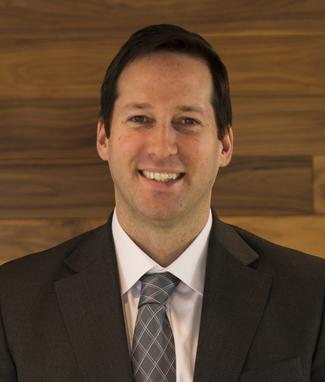 THE ONE TO WATCH Conor C. Flynn
THE ONE TO WATCH Conor C. Flynn
When Conor Flynn officially became president and CEO of Kimco this year, and he hit the ground running. After completing his first task of steering the company through an exit from Mexico, he put Kimco on track to dispose of its Canadian assets by the end of 2016. By the end of the first quarter of this year, he saw the firm’s FFO per diluted share increase by 2.7% year over year; its occupancy hold steady at 96% despite the turmoil in the retail sector; and new leases grow 19.1% at an average base rent of nearly $20 per square foot, bringing the REIT’s average base rent to $14.67, a 4.8% increase over Q1 2015. Yet that was just the beginning. Flynn developed an extensive five-year plan he dubbed Kimco’s 2020 Vision, meant to take the company through the real estate resurgence. Basically, the plan is a roadmap for the company to enhance its portfolio, focusing on high-quality assets in core markets. As part of this strategy, Flynn put into place a simple and disciplined operating structure and acquisition strategy, all supported by a very strong balance sheet, expected to create strong growth in NAV and earnings over the next five years and repay more than $1.2 billion of consolidated mortgage debt through 2020.
“Life is short and speed is life. Make an impact with the time you have, effect change by pushing the envelope and evolve.”
Flynn represents a new breed of CEO. Having joined Kimco as an asset manager in 2003, he moved up the ranks to become COO, CIO and president of the Western Region before being elected to lead the firm. Not yet 40 years old, he is bridging the gap between the old school and the new. He doesn’t limit transparency and communication to quarterly earnings calls; Flynn is a regular on Kimco’s social media accounts as well as its award-winning blog. He’s also driven Kimco to adopt new technology that will improve operations and grow revenue throughout its 550 shopping centers.
He also developed and implemented the Kimco Leadership Advancing Business Strategy program, which gives employees across different departments the opportunity to come together and spend days brainstorming on the REIT’s organizational and operational strengths, development areas, strategic opportunities and threats to success. These groups present their ideas to executive management and investors, and the winners’ programs are implemented. Some of the firm’s biggest initiatives have bloomed through this mentorship program.
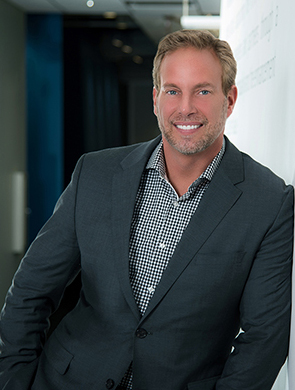 THE MIRACLE WORKER Steven P. Grimes
THE MIRACLE WORKER Steven P. Grimes
Through his strategic focus on employee talent and empowerment and company culture, Steven Grimes has led Retail Properties of America Inc.’s transformation into a leading owner and operator of class A multi-tenant retail shopping centers. This has not only helped RPAI successfully navigate through the great recession, but also saw its initial listing on the NYSE exchange in 2012 and the continued execution on its portfolio refinement strategy that was announced in 2013. When he assumed the role of president and CEO in 2009, Grimes committed to position RPAI for a successful liquidity event—the ultimate IPO. Yet with $2.3 billion in debt maturing in 2009 and 2010—the height of the downturn—the firm had limited access to capital. On top of that, three of its largest tenants completed their bankruptcy proceedings and were in liquidation, resulting in over three million square feet that became vacant. Faced with these challenges, Grimes empowered his leadership team to create a plan with a desired destination in mind, which included a strengthened balance sheet and a strong focus on increasing occupancy and creating a diverse tenant mix. In 2009 and 2010, RPAI was able to refinance, pay down and extinguish $2.6 billion of debt and address nearly 80% of the space that had become vacant under bankruptcies, resulting in a leased rate of 90.2%.
“If you start with the end in mind and always look for what’s not on the page, you’ll always be able to get around detours on your road to your ultimate destination.”
Further, no single tenant in the portfolio represented more than 3.2% of annualized base rent. The company’s position was strong enough to be listed on the NYSE, maximizing shareholder value and providing additional access to capital. Since its initial listing through the end of 2015, the total return for RPAI shareholders has been an impressive 119%, compared to the Bloomberg Shopping Center index of 51% and S&P 500 of 56%. Grimes’ commitment is evident to his employees. As VP Michael Haddad states, “His presence and participation in RPAI’s planning, growth and maturity as a public company that truly cares about the well-being of its employees has been, and is, the closest to a family environment I’ve had the opportunity to experience in my career. He always ‘has our backs’ and we try our best to always have his.”
 MOST PROACTIVE Tobin Grove & Steve Van Amburgh
MOST PROACTIVE Tobin Grove & Steve Van Amburgh
To achieve success in CRE development, it’s necessary to be proactive. Toby Grove, president, and Steve Van Amburgh, CEO, have exhibited this trait through their many years of leading KDC through various market conditions. Keeping a close eye on economic and commercial real estate trends, KDC has focused on developing projects that are a “home run” for both clients and communities—as well as the environment, as KDC was an industry leader in sustainable practices even before the LEED program was established; to date, 100% of KDC’s projects in development are LEED certified. And when signs that the market was headed toward a downturn started to emerge in 2005, Grove and Van Amburgh turned KDC’s focus on value-added office space and launched Intellicenter, a high-performance national office building program whose success was built on repeatable design with cost-effective facilities. Ultimately, they sought to provide a “smarter” office building based on the knowledge from previous BTS corporate clients—all highly adaptable with large and efficient floorplans, abundant parking and economical pricing, while maintaining LEED standards.
“The people of your company do not work for you. You work for them.” —Van Amburgh
Four years ago, Grove and Van Amburgh started to steer the company toward meeting the needs of corporate America, focusing on mixed-use development with a true live-work-play environment. Among their biggest ventures is the ongoing CityLine in Richardson, TX, a 186-acre project that will serve as the corporate headquarters of State Farm and house a Raytheon campus, among other aspects, as well as the 240-acre Legacy West in Plano, TX, that houses Toyota, Liberty Mutual and FedEx Office. Now Grove and Van Amburgh have their eyes on developing next generation broadcast facilities, such as the new state-of-the-art news facility for NBC 5/KXAS-TV that broke ground in 2012 in CentrePort in Fort Worth. Employees’ long tenure at KDC is a testament to the leadership of Grove and Van Amburgh—called the “Yin & Yang” of the company. “I love the culture they have established,” stated one staffer. “There is something very freeing about working with a group of people who absolutely have no time for negativity because we are all so busy working hard and taking care of our team. This is the best company I’ve ever worked for, and there’s no doubt that is established by leadership.”
 THE GENTLEMAN Larry P. Heard
THE GENTLEMAN Larry P. Heard
Genuine. Ethical. Devoted. Those are just some of the words used to describe Larry Heard, who joined Transwestern in 1981 as an agency leasing broker and became CEO in 2002. And if you ask those who work for him, Heard is the driving force behind not only Transwestern’s success in business and growth in the industry, but also its status as a “Best Place to Work” in markets throughout the country. Recognizing that the people at Transwestern are what drives success, Heard believes that providing an extraordinary workplace and experiences for its people will in turn inspire them to provide extraordinary experiences for clients, directly impacting growth. As such, he has put in place many programs that contribute to the overall well-being of team members, including wellness; financial training; professional skills development; mentorship; community service opportunities; flexible work hours and telecommuting capabilities; and social/networking activities, including Transwestern Young Professionals and holiday events. Some offices have redesigned their workspaces to allow parents to bring in their children, if needed, and earlier this year, the firm announced a national partnership with Make-A-Wish.
“What drives me? Competing to achieve at a high level with a team of terrific partners and developing lasting relationships —doing what say we will do.”
Oft-described as a consummate professional, all-around good person and “true gentleman of impeccable character” by those who work with and for him, Heard’s dedication to servant leadership is evident in all he does. “There is a reason so many young associates try to emulate Larry. I can unequivocally say he has fully earned the respect that everyone in this organization has for him,” says one poll respondent. Another says, “Larry has provided me with a job that I enjoy coming to each day. The environment in the office is one of mutual trust, respect, and satisfaction that is nursed from the very top of the company and down.” And yet another relates that Heard “comes with all of the quintessential leadership qualities—he’s intelligent, passionate and articulate—but he has that X factor. Larry values a firm that is comprised of compassionate people and are one big family driving toward a common goal together. When times got tough during the recession, he took a pay cut so that he could save jobs. He genuinely cares about his people…I’ve never seen anyone like him. He’s incredible.”
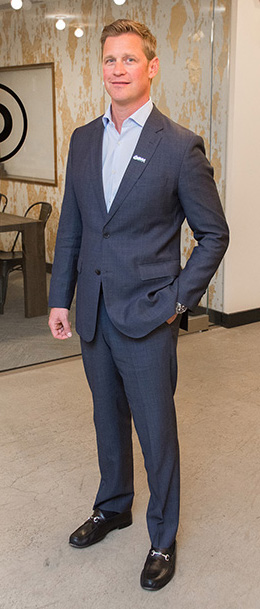 THE DIVERSIFIER Kevin Maggiacomo
THE DIVERSIFIER Kevin Maggiacomo
For many leaders, diversity is a major initiative as they move their companies toward the future. For president and CEO Kevin Maggiacomo, diversity is the core component of SVN International Corp.’s future success. Last year SVN rebranded with a goal of creating a Shared Value Network of openness, inclusiveness and innovation. This meant intentionally recruiting and empowering women, Millennials and minorities because, as Maggiacomo said, “It’s not just a good thing to do, it’s good business.” This plan was put into action by the CEO in 2012, when Maggiacomo had a “wake-up call” and made it his mission to gender-balance his leadership team—a discovery that was documented in a 2013 TEDx talk, “Awakening the American Dream.” Moving outside of the boardroom, in 2013 Maggiacomo founded 5050×2020.org, a grass roots, web-based movement to create gender-balanced leadership in all organizations worldwide by the year 2020. A year later, he realized this goal when SVN’s board became gender balanced. He is also a staunch supporter of organizations like CREW Network, Project REAP and Women on Boards 2020. His crusade continued into 2015, when he testified in front of the Massachusetts legislature on behalf of a Women on Boards bill and joined former British Prime MinIster Tony Blair at the Closing the Gap conference speaking on the importance of diversifying leadership boards. Maggiacomo’s efforts have trickled down; a few women leaders in the organization have formed the SVN Women’s Commission, a grassroots networking group with the goal of mentoring and recruiting women to commercial real estate. As a result of Maggiacomo’s internal outreach and recruiting efforts, 40% of all new SVN franchises were minority or women-owned in 2014, compared with just 2% in 2008, representing a 1000% increase, and the percentage of women attendees at SVN training camps has grown from 4.6% in 2012 to 28.8% in 2015. SVN updated its parental leave plans to be more inclusive last year and this year released its “Millennial Report” on the importance of diversity in attracting CRE talent. Innovative, visionary and forward-looking, Maggiacomo’s employees have nothing but positive feedback for him. More than a few, in fact, described him as a fighter against the status quo and disruptor of the “Good Ole Boys’” club in the industry.
 MOST HANDS-ON L. Heather Mitchell
MOST HANDS-ON L. Heather Mitchell
Heather Mitchell is never comfortable with the status quo. Not only does she take part in all aspects of the firm’s operations—several commenters said she wouldn’t ask someone to do what she herself would not—she also ensures that all Capri Investment Group’s employees are involved in the firm’s major operations. Her ability to make all members of the firm feel important is part of the success of Capri, which had $3.5 billion in real estate equity and structured finance investments at the end of last year. During her tenure as president and chief operating officer, Mitchell has instituted a number of new initiatives that encourage creativity and connectivity, including monthly “Think Tank” meetings of various departments to brain storm ways to be more efficient and think of new business ideas, as well as regular meetings with key department members to share updates, suggestions and best practices. She recognizes the value that is generated when employees of all ranks are ingrained in market trends, news and interesting topics, so she encourages participation from all of her team. A natural born leader with courage and a competitive spirit, Mitchell also finds it important to make her firm a fun and exciting place to work. These include publicly sending kudos to her team for accomplishments to make them known they are appreciated, and holding bocce ball games at the start of the annual reporting season to remind employees that even during times of stress and tension, they’re still a team that can work together to win.
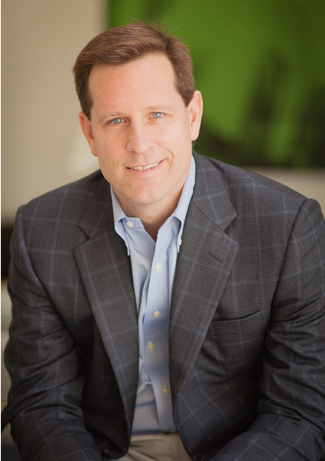 MOST CONNECTED Tim Morse
MOST CONNECTED Tim Morse
It isn’t very surprising that the chief executive officer of a CRE tech firm is also among the most “connected” of all the businesses’ leaders. Tim Morse joined what was then called Auction.com a year ago and since then has led the firm’s rebrand to Ten-X and launched a new online sales option aside from the signature online auction format dubbed Offer Select, taking the firm beyond simply auctions. What makes Morse stand out, though, isn’t so much his use of social media to share messages externally, including utilizing Periscope when the firm announced the rebrand at this year’s South By Southwest Interactive Festival in Austin. It’s that he led the creation of Ten-X TV, a bi-weekly TV show broadcast between all eight nationwide Ten-X offices to help increase internal communications. That’s where the firm shares news and interviews with key company figures to share what their teams are doing, all in an effort to educate the rest of the company on other peoples’ roles. These broadcasts have become a morale booster in addition to an information source for Ten-X employees.
“Whether you’re building a career or a business, focus on making a long-lasting positive impact, not short-term gains or gratification.”
These efforts are part of Morse’s mission to make Ten-X not only the biggest “disruptor” in CRE today, but to also make the company more “people-centric” place to work. From sneaking in line to serve beans to employees on a company-provided taco day, to helping to start a new employee Intranet and a new Xtra Mile employee recognition program, to hosting an annual Poker Tournament, Morse makes it his mission to make everyone at Ten-X feels like they play a part—and have a voice—in the company.
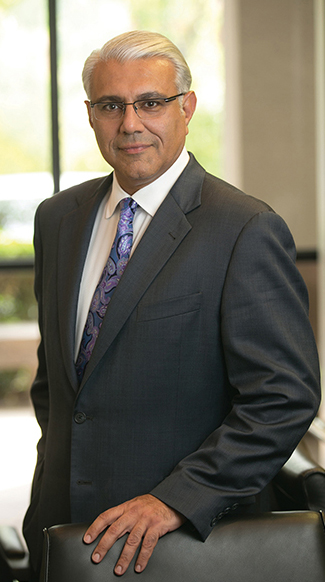 THE STRATEGY & EXECUTION MAN Hessam Nadji
THE STRATEGY & EXECUTION MAN Hessam Nadji
The newly minted head of Marcus & Millichap, Hessam Nadji brought more than just leadership skills to his new role. As he was elevated into increasingly senior positions, he evolved throughout his two-decade history at the firm from a background in technology, research and advisory services to achieving exceptional growth as head of the company’s specialty brokerage divisions prior to his appointment as CEO. Also charged with growing the firm’s national brand, he played a key role in growing the firm’s reputation as a leading investment brokerage company and mortgage brokerage operation (via Marcus & Millichap Capital Corp.). In addition to his background in research, which helped to set the firm apart from its peers in the industry, Nadji’s focus on service is helping him in his role as president and CEO. “My entire career has been defined with trying to figure out the clients’ needs, the brokers’ needs and bringing the two together through what the company does,” he says. His combination of employing strategic thinking to execute his goals leads many who work with him to say he is smart, creative and driven to accomplish the best interests of the firm’s agents and clients. One respondent in particular notes that Nadji “is a forward-thinking, research-driven CEO that has strong ideas of how to move the CRE industry and Marcus & Millichap forward, especially as a new generation of investors joins the discussion.” As Nadji himself puts it, “If people have a clear idea of where we’re going, what’s expected of them and where they fit in, then they will have higher morale, more productivity and actually believe in something. I do everything in my power to enable talented, eager, motivated people who want to do something special to be able to get to work instead of losing time in inefficiencies or confusion or conflicting goals.”
 THE COLLABORATOR Jay Olshonsky
THE COLLABORATOR Jay Olshonsky
When Jay Olshonsky became president of NAI Global in 2012, he was faced with a faltering organization with no clearly defined identity, objectives or growth strategy. He knew in order for NAI Global to remain competitive he’d have to convince the independently owned member firms to embrace new ways of thinking and approaching the business. With his entrepreneurial spirit, belief in reverse mentoring and learning from others and focus on equality across his team, he helped to shape the disparate member firms into a strong global network with greater market representation and a more substantial institutional platform (with the acquisition by C-III Capital Partners also in 2012). As one individual who works with him told Forum, “anyone who knows Jay will know that one of the worst things you can say to him is, ‘this is the way it’s always been done.’” NAI Global’s growth and transformation over the past four years is just as impressive to its members as it is to outside observers. Among the countless comments that came in through our survey were the following: “Jay treats his organization as a family/partnership, where everyone benefits from the success. It’s truly all for one and one for all.”
“Fear and the burning desire to do better drive me. If you work for someone who always says ‘you cannot’ or ‘no,’ run away.”
Steve Balkman, NAI Puget Sound Properties, relates, “Jay leads a network of individually owned real estate companies, all with diverse interests but all seeking to be top-of-class real estate advisory firms. The iron hand does not work in our organization. Jay seems to have figured out how best to implement change in this diverse organization.” And since he’s taken over NAI Global, Rick Medinis of NAI Robert Lynn says he feels that “our network has become more cohesive, and team oriented, as evidenced by our record revenues throughout the network”
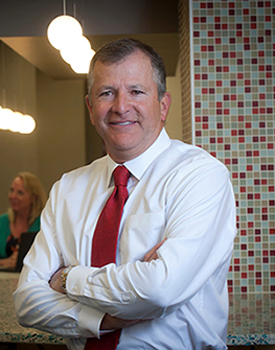 MOST NURTURING Eduardo Padilla
MOST NURTURING Eduardo Padilla
Having led NorthMarq Capital since 2002, Ed Padilla nurtured the firm through its growth from three offices to 36 nationwide, grew its production volume to $11 billion and increased its mortgage servicing portfolio value nearly six-fold to $47 billion. His role became larger in 2012, when he was asked to take over the CEO role of NorthMarq Cos., which today also includes Cushman & Wakefield/NorthMarq and Cushman & Wakefield/Commerce. In preparation for this, Padilla created a co-leadership role of president of NorthMarq Capital and groomed his successors—Jeff Weidell and William Ross—to follow his lead and continue the firm’s growth and success. And Padilla continues to have his hands on all aspects of the firm’s operations and still hosts all of its internal employee functions and events across the country. Padilla’s supportive nature doesn’t only apply to the overall organization and C-suite; his open-door policy allows staffers of all levels to talk to him. And of all of NorthMarq’s events, the most popular is the week-long CEO Gram fundraiser, where employees can purchase CEO “grams” that include a note to their co-workers and a themed token such as candy bar. Padilla takes hours of his time to hand-deliver the grams to employees, stopping to discuss how they like their jobs and what personal interests they have outside of the office. An employee for less than a year, SVP Forty Semadeni already sees that “there is a general respect and caring for all of the employees from Ed, and for each other. I have never worked in another organization where I have felt this culture so clearly and broadly.” Another SVP, Greg Benjamin, points to what he dubs the firm’s “horizontal org. chart. Employees are provided with all of the tools necessary to be successful. Hard work is the expectation with results rewarded via compensation and recognition. I’ve been in this business 31 years and Ed is by far, the best boss I’ve ever had the pleasure of working with. We work ‘with’ Ed, not ‘for’ Ed.”
 THE ICONOCLAST William O. Passo
THE ICONOCLAST William O. Passo
When Bill Passo developed the concept for tenant-in-common ownership in the early 1990s, many in the industry scratched their heads. Before then, there has never been a structure in place for multiple investors to share the risk—and returns—in a deal. Yet Passo championed the idea, taking it from a notion unheard of throughout the NASD Broker Dealer nationwide network and the real estate financing industry, all the way to Washington, DC, where he petitioned for what would become the very first TIC structure in real estate. That led the way for the growth of what became a landmark change in the real estate investment industry, and the rest is history. As the TIC structure grew to a $4-billion-plus industry, being formally validated in 2002 and evolving since then, so did Passco Cos. LLC. And when the downturn hit and reduced the number of TIC sponsors, which numbered as many as 80 by the late 2000s, by some 95%, Passco remained afloat, with Passo at its helm as CEO.
“Each day brings new opportunities and challenges, and I don’t want to miss them.”
His ability to not only be a pioneer in the field but also to successfully guide his team through even the worst of times, is what instills confidence and admiration in those who work with him, many of whom have been there for over a decade. Staffers shared such comments as, “Being around Bill is an energizing experience;” “Bill is the reason I am here;” “His accomplishments so far are a form of motivation;” “Everyone at the company is better off for having been employed there,” and “Working with him is an honor and a privilege.” And, indicating that the love and admiration between Passo and his team is mutual, one respondent said, “I have seen Bill moved to tears in front of the entire company when he is speaking on something he is passionate about or someone he is proud of.”
 LORD OF THE EMPIRE Jorge M. Perez
LORD OF THE EMPIRE Jorge M. Perez
As he led his firm through the evolution of the US real estate industry, Jorge Pérez has gone from being nicknamed the “Condo King of Miami” to leading a diverse empire with condo, mixed-use and public/affordable developments throughout the entire Southeastern US. Since the 1970s, he and the Related Group have been at the forefront of South Florida’s transformation and, in the process, have developed a natural ability to identify neighborhoods prime for development. As he transitioned to the luxury condo arena, he played a critical role in the creation of some of South Florida’s most recognizable neighborhoods like South Beach’s South of Fifth and Downtown’s Brickell. Yet, the condo bust of the late-2000s drove Pérez to take steps to diversify Related’s offerings, reentering both the multifamily and public/affordable industries. The firm’s model and policies have also become the benchmark for the business; for instance, Related’s 50% deposit requirement quickly became the industry norm and its entrance into mostly undeveloped areas has led to the formation of some of South Florida’s most important new neighborhoods. It was a good lesson for Perez: “It was the first time that I was truly faced with disaster. We learned that you are never bigger than the market and that despite the best laid out plans, things that are beyond your control can destroy you. We learned humility and have become much more conservative in our approach to business.”
“You can only become truly good at something if you’re passionate about it.”
As chairman and CEO, Pérez has led Related to become the largest and most recognizable developer in the Southeast and one of the largest Hispanic-owned companies in the US. Over his 46 year career, Pérez has built, rehabilitated and managed over 90,000 units and currently has 21,287 units—worth upwards of $16 billion—in the pipeline. As of late, Pérez has expanded into international markets, including projects in Argentina, Mexico, Panama, India and Brazil. And, like any successful businessperson, Pérez is devoted to philanthropic activities, namely, his support of the arts in his local community. He’s just as passionate about the employees who work at Related, who have the following to say: “He’s a real estate genius who’s transformed Miami;” “He is innovative, a visionary and an inspiration that makes me think bigger and aim higher;” “His vision and motivation is something that all of us employees admire and feed off of.”
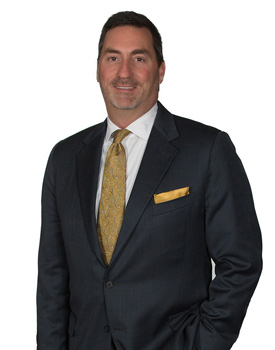 THE ACTUALIZER Mark Rose
THE ACTUALIZER Mark Rose
Ambitious goals are the norm for Avison Young chairman and CEO Mark Rose. He crafted his vision for the firm over his decades in the CRE industry, and put his plans to create “a different kind of CRE company” into motion at an unwavering pace. One of the payoffs came late last year, when Forum named it as the fastest-growing company of its size. Indeed, under Rose’s guidance, AY has increased its revenues and profits by more than 10 times in just seven years, with $411 million in revenue, a 47% CAGR, headcount of 2,300 in 77 offices across five countries. All of this was done under a principal-led ownership culture—a business model oft-described as disruptive to the real estate industry’s current trends—but that isn’t the only thing that makes the AY culture stand out. Rose’s focus on innovation is seen in its “secret sauce”—Affinity Groups, which represent a game-changing management approach. Replacing internal P&L business units, these self-managed groups across the company work together to coordinate client pursuits, develop standards and best practices, share research and develop client tools. For instance, AY’s diversity & inclusion affinity group launched in 2015 with the formation of the Women’s Network and mentoring program.
“As a leader, your role is to make everyone around you better than you are. People are not fungible; they are the foundation of success.”
Rose also pushed forward his promise to increase AY’s technological capabilities, utilizing a broad range of new products and platforms to increase performance and efficiency. In fact, CRE tech conference REALComm awarded Avison Young the coveted Digie Award for Best Use of Automation–Commercial Services in 2015. All who work for Rose attest that he is a person who develops a vision, clearly communicates it and does not stop until he brings it to fruition. And these comments don’t only apply to the firm’s operations and bottom line. When Rose recently introduced a company-wide health and wellness program, he went beyond practicing what he preached, shedding some 60 pounds and serving as a great motivator to the entire organization.
 THE TURNAROUND KING Glenn Rufrano
THE TURNAROUND KING Glenn Rufrano
Ask anyone in the CRE business to name the top three specialists in turning around real estate companies and Glenn Rufrano would be on their lists. Since 2000, he has successfully led turnarounds at New Plan Excel Realty Trust Inc., Centro Properties Group and Cushman & Wakefield Inc., alleviating major issues including failed mergers, declining stocks, debt issues and organizational inefficiencies. And last year, he took over the reigns as CEO of VEREIT Inc.—formerly American Realty Capital Properties, which faced massive accounting irregularities at the end of 2014. Rufrano implemented an ambitious new business plan to re-brand the company, evaluate the portfolio, expand the board of directors and address concerns about the balance sheet. For the next year, under his leadership, VEREIT changed course and began to follow its path to recovery. At the end of this year’s first quarter, all signs seemed to indicate a healthier and more stable VEREIT. The firm had shed some $1.7 billion of assets, established a sustainable dividend, significantly reduced its debt, brought its balance sheet further toward investment-grade status and almost fully reconstituted its board.
“Real estate is a great industry with many entry points. If you can find a role that fits your personality and one in which you have a passion, you will excel.”
In addition, VEREIT’s Cole Capital raised $144.2 million of new capital in Q1, a 24% increase over the fourth quarter of 2015. Based on the accomplishments over the past year, S&P Global ratings revised its outlook on VEREIT from stable to positive, and Moody’s Investors Service upgraded VEREIT from negative to stable. Though the turnaround is still coming together, Rufrano’s history of success bodes well for VEREIT’s future.
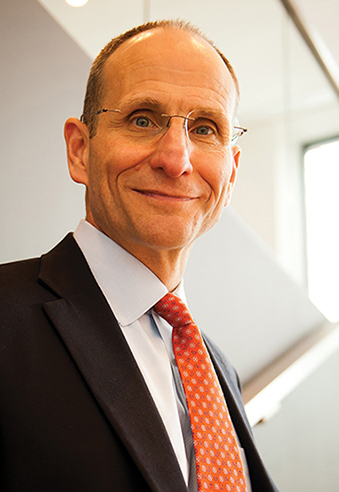 THE POWERHOUSE Bob Sulentic
THE POWERHOUSE Bob Sulentic
Already a huge player in the CRE services business, CBRE Group Inc. has grown exponentially since Bob Sulentic took the helm as president and chief executive officer in 2012. Here are some stats: revenue has grown from $6.5 billion in 2012 to nearly $11 billion in 2015, nearly double that of its closest competitor; normalized EBITDA increased from $918.4 million in 2012 to $1.4 billion in 2015 and adjusted EPS grew from $1.22 to $2.05 in the same period; headcount rose more than 50% to over 70,000; property under management increased from 3.3 billion square feet in 2012 to 5.2 billion feet in 2015; and lease and sale transaction value jumped from $189.8 billion in 2012 to more than $310 billion in 2015. All of this has made CBRE the only company to be ranked in the top 12 in the annual Barron’s 500 in each of the past three years and its average ranking during this period (#7) is the highest of the 500 companies measured. Yet Sulentic hasn’t only focused on finances during his time at CBRE. The firm’s culture is just as important to him and, with that in mind, Sulentic’s initiatives helped the firm land several accolades for its workplace initiatives, such as 15th best employer in America by Forbes and a Most Admired Company by Fortune. CBRE employees, too, laud his skills as a leader: “Bob does a great job of communicating a clear and consistent vision for the company, and how to achieve that vision so every employee feels empowered and knows how they can contribute. Bob is an effective CEO with a strong executive presence but he is also very humble, friendly and approachable.” “I feel empowered, respected and listened to. Ultimately, I want to do well because I feel supported to do so.” “Mr. Sulentic clearly leads by example and exemplifies CBRE’s values. He’s definitely a CEO who you’d like invite home for dinner with your family.”
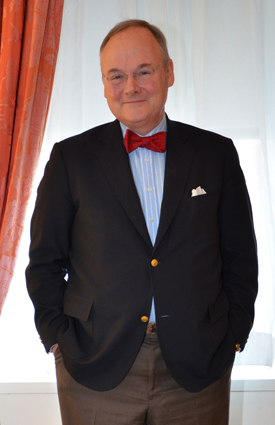 MOST BANKABLE Christopher H. Volk
MOST BANKABLE Christopher H. Volk
Throughout his 30-year career in the business, Chris Volk has successfully led three public companies. That’s a pretty big accomplishment for anyone in this business. Even more remarkable is that the same leadership team followed him throughout these ventures. Experienced in structuring, managing and financing CRE companies, Volk has a storied past. He led the largest-ever real estate LP roll-up transaction of its time in 1994; oversaw the issuance of FFCA’s unsecured debt rating in 1995, marked the first ever unsecured debt rating issued to a net-lease REIT; and in 2005 led the creation of the first CRE master trust debt conduit in the US designed to finance net-lease assets. He co-founded and lead Spirit Realty from 2003 to 2010, during which he grew it to a public NYSE-listed company and sold it for $3.5 billion. He has also served for over 16 years in numerous capacities with FFCA, including president and COO and was on the FFCA’s board of directors, and continued as COO of GE Capital Franchise Finance after the FFCA acquisition. Volk co-founded his current firm, STORE Capital, in 2011 with private equity sponsorship from Oaktree Capital, and the CEO took the company public in November 2014. Oaktree enjoyed one of the most successful private equity exits of 2016 and STORE’s stock price has shown remarkable resilience, with the highest price and total return amongst its peer group and generating a more than six-fold increase in market cap to the current valuation of $3.7 billion. As of the first quarter, the STORE stock price was up 35% since its IPO, and Volk had overseen a total return of 45.6%. Further, the company’s sell-side coverage expanded from eight to 15 analysts and its institutional ownership increased from 48 to 190 institutions. Volk’s ability to identify future opportunities and his zest for sharing his knowledge makes him, as one respondent put it, “someone you want to work hard for, not that you feel you have to work hard for.” Others stated, “He sets high expectations for employees but rolls up his sleeves along with the team;” “People who have worked for Chris before seek him out to work for him again;” “Working for Chris Volk has been life changing, not only for me, but for everyone within the organization. He has created an environment where being productive is contagious—and fun. In 25 years, I bet there will be more business leaders that come out of STORE Capital than any other company of comparable size—all products of Chris Volk.”
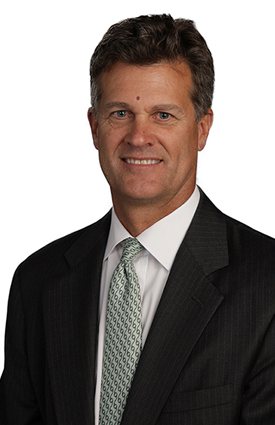 THE PERENNIAL CEO Brett White
THE PERENNIAL CEO Brett White
In 2012, Brett White announced that he was retiring from CBRE, where he’d worked for 28 years. During his seven years as CEO there, he helped to grow the company into a leader in the global commercial real estate services arena. It was a short-lived retirement. In 2014, White was back in the headlines when he assumed the helm of DTZ. Within months of stepping into the corner office, he announced the firm’s merger with Cushman & Wakefield, where he now oversees the global enterprise as chairman & CEO. It seems White was born to be a CEO. His leadership skills helped to develop not one, but two of the world’s largest CRE services firms, with seven- and eight-digit annual revenues. He’s been responsible for more than 100 acquisitions and the completion of more than 20 public and private capital raises totaling more than $7 billion. Today, Cushman & Wakefield holds a leading position in major markets around the world, including Shanghai, Hong Kong, Singapore, London, New York and San Francisco, with 43,000 employees in more than 60 countries. Brett White’s leadership is both a catalyst and an engine for the firm’s ongoing transformation.





 Copyright © 2024 ALM Global, LLC. All Rights Reserved.
Copyright © 2024 ALM Global, LLC. All Rights Reserved.



































